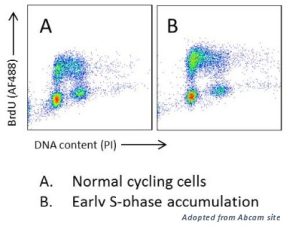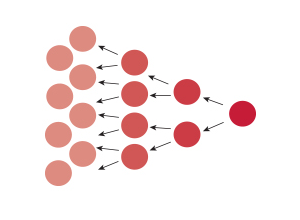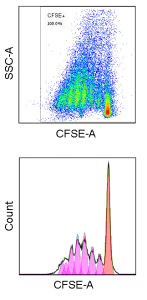
Assays to assess the proliferative activity of cells grown in culture or harvested from tissue samples are a core tool for monitoring the health, growth rate or in differentiation studies of a cell population. Often it is used to evaluate both compound toxicity and inhibition of tumor cell growth during drug development.
In flow cytometry, proliferation measurements are typically made based on average DNA content or on cellular metabolism parameters. Assays can report either total or live cell numbers, or measure DNA synthesis in single cells.
Cell proliferation by DNA synthesis measurement (BrdU)
The BrdU synthetic nucleoside is used as a thymidine homolog that is incorporated into the newly synthesized DNA of proliferating cells and can be detected using a fluorescent-labeled anti-BrdU antibody. The fluorescent intensity is proportional to the quantity of BrdU incorporated into cells, which is a direct indication of cell proliferation.
BrdU staining protocol
CFSE is an effective and popular means to monitor cell divisions which provides a versatile and well-retained cell-tracing tool. CFSE passively diffuses into cells, it is colorless and non-fluorescent until the acetate groups are cleaved by intracellular esterases to yield highly fluorescent carboxyfluorescein succinimidyl ester. The succinimidyl ester group reacts with intracellular amines, forming fluorescent conjugates that are well retained and can be fixed with aldehyde fixatives.
The dye–protein adducts that form in labeled cells are retained by the cells throughout development and meiosis, and can be used for in vivo tracing. When CFSE-labeled cell divides, its progeny are endowed with half the number of carboxyfluorescein molecules and thus each cell division can be assessed by measuring the corresponding decrease in cell fluorescence by Flow Cytometry.
There are commercially available alternatives to CFSE, for further info please contact us.
CFSE staining protocol


